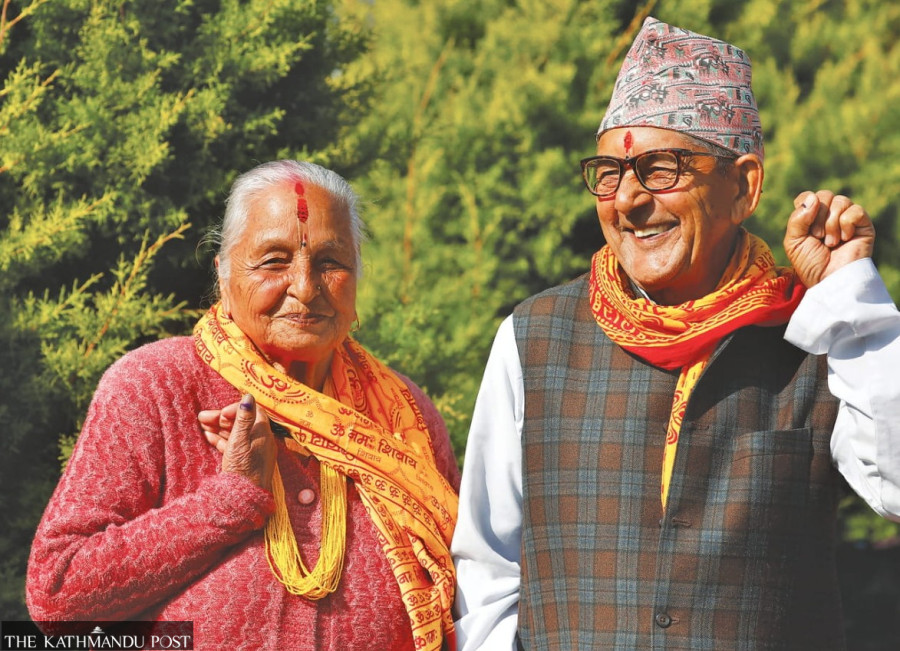Politics
Around 61 percent cast votes in largely peaceful polls
Disputes and incidents of violence were reported in some places, with one death and several injuries. Repolling required in 15 centres across provinces.
Tika R Pradhan
The single-phase second election of federal and provincial assemblies concluded on Sunday. The Election Commission’s preliminary report put the turnout at a relatively low of 61 percent.
The commission said the estimate was based on preliminary data and it could rise by one or two percentage points after final figures are received. A total of 17,988,570 people were eligible to vote in the elections.
Observers say voter frustration was clearly visible this time and major parties could face a tough fight from independent candidates, especially those from the Rastriya Swatantra Party, for lower house seats.
Although the frustration with major parties was also obvious during the May 13 local elections, the turnout then was much higher, at 72 percent.
Though disputes and incidents of violence were reported in some places, with one death and several injuries, Sunday’s elections were largely peaceful. Police had to fire in the air in Rautahat, Siraha, Chitwan, Dolakha, Bajura and Humla districts to disperse troublemakers.
“We regret the sad demise of one person in Bajura during a clash and a few injuries in different parts of the country,” said Dinesh Thapaliya, the chief election commissioner at a press meet organised after the polls ended. “We also draw the government’s attention to provide necessary treatment to the injured.”
Two people, who were injured in Bajura, are being treated while the other injured have already returned home after treatment, Thapaliya said.
Although the commission does not have exact data on the number of arrests made on Sunday, several individuals involved in disturbing the elections were detained across the country. The commission has instructed the authorities to take legal action against those arrested and nab those on the run.
Elections were disrupted at as many as 15 polling stations in Surkhet, Nawalparasi East, Gulmi and Bajura, where the commission will conduct repolling within a week.
“Reelections will be held in Surkhet, Nawalparasi East and Gulmi in two or three days, but in Bajura it will take 4-5 days for the same as ballot papers need to be reprinted,” said Thapaliya, the chief election commissioner at a press meet. “We plan on completing vote-counting [including at stations where there will be re-polling] within the next eight days.”
In Nawalparasi East, a representative of one of the candidates had poured acid on a ballot box.
According to Thapaliya, counting in Kathmandu and some other districts will start from Sunday night while the ballots of seven remote districts will be flown in helicopters to counting centres by 4 pm on Monday.
In 2017, the federal and provincial polls were held for the first time in two phases. The voter turnout then was 68 percent.
Thapaliya said all the four ballot papers [two of House of Representatives and two of provincial assemblies] would be counted simultaneously and the results would be announced in the next eight days.
Several complaints have been registered at the commission claiming that carelessness by election officers at various polling stations resulted in voters casting FPTP and proportional representation votes in wrong boxes.
Election observers have said Sunday’s election remained largely peaceful despite some violence.
“Today’s elections were largely peaceful leaving aside a few incidents of violence,” said Bikal Shrestha, executive director of National Election Observation Committee (NEOC).
Shrestha said some of the NEOC’s observers were roughed up by political cadres who also tore up the observers’ identity cards in Bajura.
A total of 11,543 candidates are in the fray for the first-past-the-post and proportional representation elections for the House of Representatives and provincial assemblies.
According to the commission, 2,412 candidates are contesting the House seats under the FPTP system. Among them, 2,187 are male and 225 female. For the 110 proportional representation seats, there are a total of 2,199 candidates—1,187 female and 1,012 male.
Likewise, 3,224 candidates including 280 women and one under ‘other’ category, are contesting the 330 provincial seats under the FPTP system. For the 220 proportional representation seats up for grabs, 3,708 candidates (including 1,511 women) are in the fray.
After the final results are out, there will be an entirely new political set-up in the country—new president, vice president, speaker, deputy speaker, prime minister and new cabinet in Kathmandu.
There will also be seven new chief ministers and their cabinets in the seven provinces. A total of 825 representatives will be elected to the House of Representatives and provincial assemblies after the vote.




 22.59°C Kathmandu
22.59°C Kathmandu














